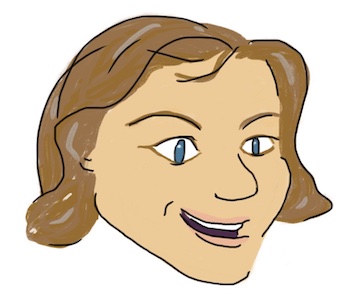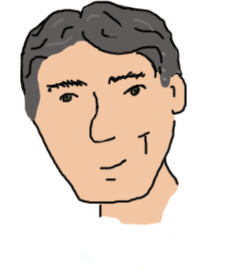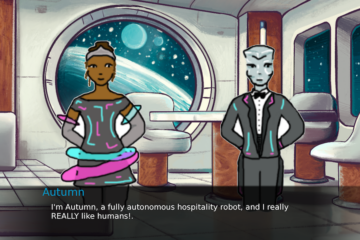Blog topic suggested by Maura Yzmore
I have never enjoyed writing craft books. There is perhaps something wrong with me. Or I’m just too opinionated.
But I have treasured and memorized some jewels from my mentors. Here they are, with very bad drawings of them. You can tell which drawings I did first because they are the simplest, no lack of love is intended!

“If you describe your character’s hair on the first page, you have nothing interesting to say about them.”
Mary Grimm
There’s a habit among naive writers to focus on things like hair and eye color. Who doesn’t want purple eyes and raven tresses? But in the world of words, raven tresses and purple eyes are a dime a dozen, and ultimately fail to tell you anything about the brain inside those tresses. What makes a character interesting are their quirks, their contradictions, their passions. Beatrice isn’t purple eyes and black hair, she’s a hard-line cynic who nevertheless keeps waiting for evidence fairies exist.
Hold off on the personal ad details unless it’s plot significant.

“Tell me where the light is coming from.”
Karen Joy Fowler
Description, setting scene, is often about one key detail. As a beginner you may find yourself writing whole pages of description that could’ve been one sentence. Karen’s advice to think about where the light is coming from is both poetic and simple. Sun from a skylight or a red glow from a neon beer sign say more about the room you’re in than a list of furnishings.
This reminds me of painting. Especially the impressionists. How a single stroke of white can make a black bodice velvet, a peach fuzzy. When I get lost in the weeds of conveying a place, it helps me to stop and ask myself “Where is the light coming from?” and pick that one detail.
Or I write too many details, and then play “Survival of the Coolest” with them.

“It’s only a rough draft.”
Mary Turzillo
Possibly the most vital advice. There are some writers who profess to compose perfectly in one draft, but they are either lying or doing the first draft all in their head, and I don’t need to do that. It’s okay to need to put words down to see them clearly. It’s okay to write awful first drafts.
My most well-received stories all went through an insane number of drafts, and I used to think that showed something lacking in me, that I needed to do so much work, why couldn’t I write the last draft first? Now I realize, no. This is how I work, and there’s a joy and pleasure in revising that I treasure.

“Writer’s block isn’t an inability to write. It’s the belief that everything you write is shit.”
Maureen McHugh
Our emotions change how we read what we’ve written, they don’t change the words on the page. Sometimes you just gotta … not listen to your emotions. Push ahead. This works well with Mary’s advice. I tell myself okay, this is shit… so what? It’s a shitty first draft. And then, often, when my head is in a better place and I come back to it, I find it’s only, eh, 40% shit.
I also had to repeat this many times to myself to understand that there was nothing WRONG with me if I didn’t feel like writing at a particular time.

“If you write something true, it’ll outlast you.”
Ken Vibbert
My dad wasn’t talking about nonfiction, but the way that fiction is used to convey truths. When I read old books and they feel dated, verses old books that feel timeless, the difference that I judge between them is honestly. Jane Austen’s observations about human behavior still ring true because she observed and was honest in describing what she observed. So very very many other authors, well, you see their giant blind spots, the ways they deluded themselves because they didn’t want to see the point of view of certain characters.
So, constantly, as I write, when I find a scene not working or feeling off, I interrogate my honesty. Is that how this character would really behave? Would this relationship really change that way? Sometimes it’s hard to be honest, I feel myself wanting to be a little unfair, to fudge the test results. I won’t say my conscience always wins, but it does seem the stories where it does are more successful.


